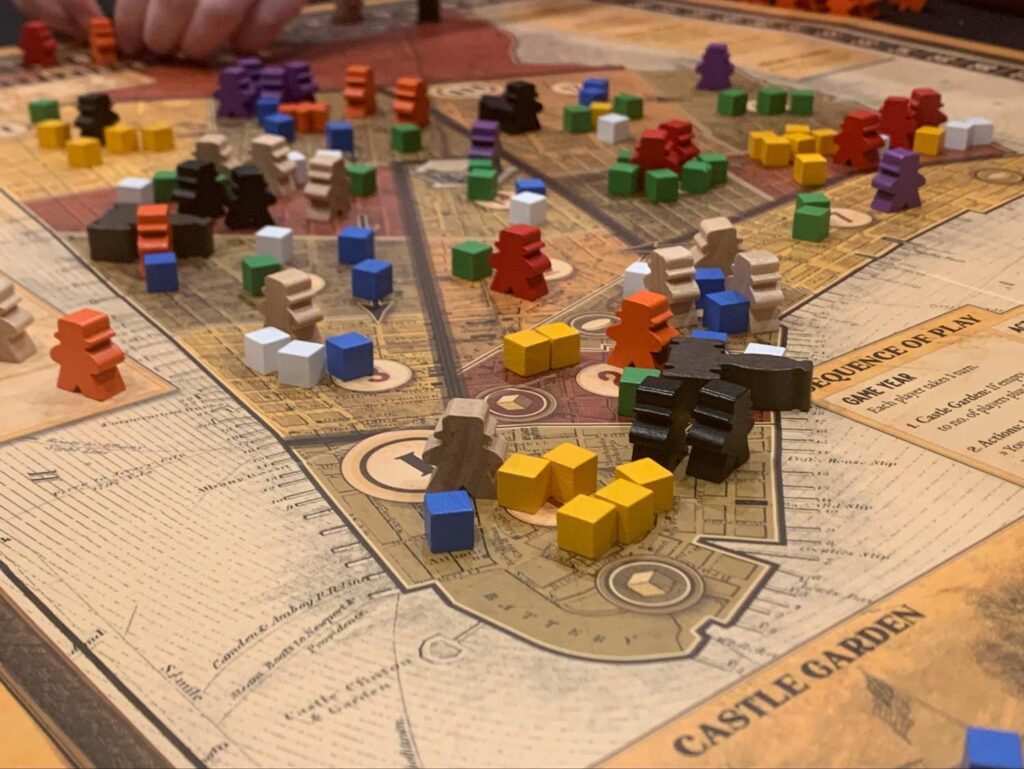
Are you the type of person who enjoys a good argument or do you avoid conflict at all cost? “We’ve all heard stories of someone getting mad when Monopoly is played by the actual rules—especially when no money is placed on Free Parking—only to flip the table when the roll of the dice finally lands them on Boardwalk.”. Time to pay the rent.
Conflict isn’t in short supply these days, no matter where you live. It’s in the news, our workplaces, our neighborhoods, and even our own families. Playing a solo game through an app is sounding better and better. So why would anyone sit down at a table with other people and willingly embrace conflict, especially as a form of entertainment? Let’s start answering that by defining five types of conflict in board games.
Direct conflict is a head on collision between wills to power. There’s going to be a fight with a clear winner or loser like in Tammany Hall, Arcs, or Root. Relational conflict gives players the challenge of trying to accomplish goals as a team instead of individuals in games like Pandemic or Robinson Crusoe. The financial conflict of managing money and where to direct it can be found in games like Prêt-à-Porter or Goodcritters. Organizational conflict comes when we need to put our unsorted resources together in a functional way and make them work for us in engine builders like Ark Nova or Viticulture. Internal conflict is the things inside of us that others may not see but games like Thunder Road: Vendetta or Throw Throw Burrito can help us resolve.
Have you considered that board games can actually be used as tools to help teach how to navigate the unavoidable reality of conflict? Like the Danger Room from the X-Men, we can dial up any one of several scenarios to enter into on our table tops and see how we perform, take some feedback, and improve how we handle that type of conflict.
Let’s talk about five of those types of conflict.
Navigate Direct Conflict
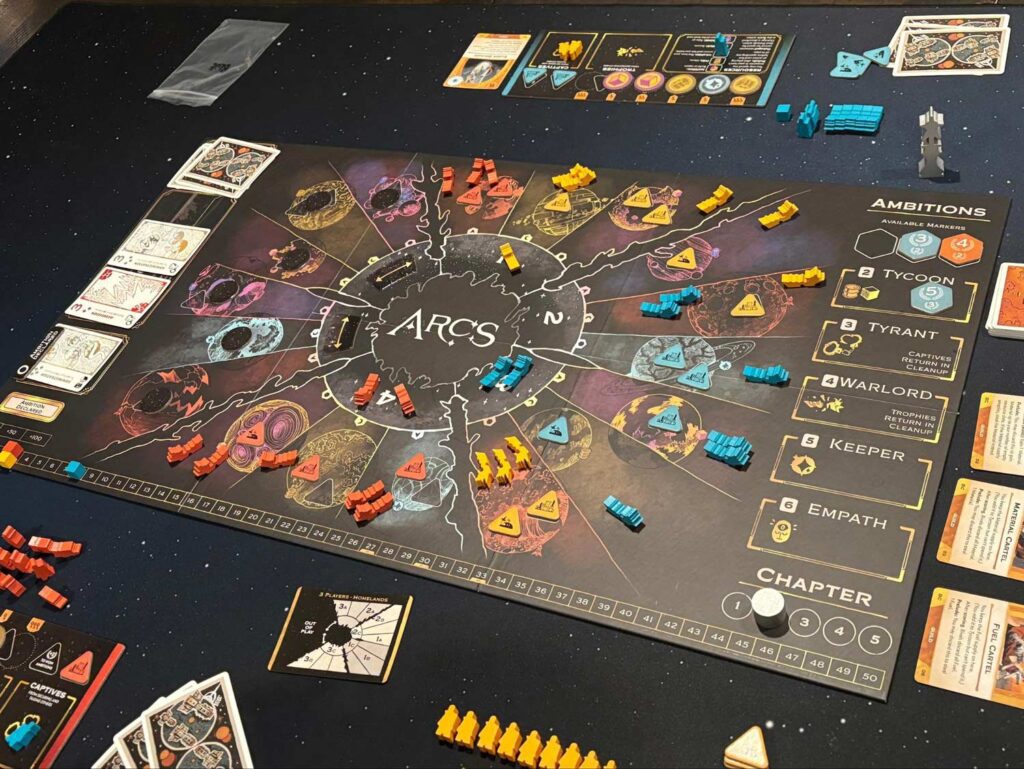
Direct conflict is the out and out fight. You don’t get much more direct than when you have something I want, so I’m going to whack you and take it. Like Billy the Kid in Bill & Ted’s Excellent Adventure, what I win, I keep. What you win, I keep. Not every player is going to respond with, “Sounds good, Mr. The Kid!”
Whether you’re in conflict over area control or resources, direct aggressive conflict in games can be a massive turnoff for some gamers. Doomtown: Reloaded is literally a game of “I stay on my side and you stay on your side” until one of us gets bold enough to start shooting. Radlands is a brilliant lane battler where the goal is to blast each other out of the way until you get access to their bases, and then blast those to kingdom come. Winner is the one left standing when the dust settles. When Tammany Hall came across my radar for the first time I heard it referred to as “the mean game.” You’re trying to gain control of New York City in the late 1860’s and one of the actions available is spending literal slander tokens to reduce your opponent’s meeples on the board in an effort to control voting outcomes.
Instead of avoiding direct conflict, these types of games are opportunities to lean into it. Yes, there’s a conflict. Yes, someone is going to lose. Can we shake hands at the end of it? Not all direct conflict is a bad thing, because sometimes we do have to fight for what’s good. We can’t just lie down when someone comes knocking and says, “I want what you have. Gimme.” That doesn’t mean we will necessarily win, but we can learn how to navigate the direct conflict instead of avoiding it.
Scythe does an excellent job of handling direct conflict because at its heart, it’s a game of resource efficiency. However, there is the constant threat of conflict. You stay on your side and I’ll stay on mine, then we’ll all get along just fine. Cross that line and you’re going to regret it. Maybe.
Arcs offers players direct conflict. The game state is dynamic so you may be incentivized to destroy your opponents ships like a warlord or hold their agents captive like a tyrant. If space conflict isn’t your jam, the woodlands of Root offer a cuter but no less confrontational arena. Direct battles leave casualties on each side with a backdrop of rodent guerilla war, avian turmoil, and otter mercenaries.
Direct conflict can be challenging because of the feelings it stirs up. Some people thrive in conflict and some people avoid it like the plague. The experiences these types of games offer can teach you how to deal with the feelings so when real life comes knocking, you’ve walked the road a few times at the table.
Navigate Relational Conflict
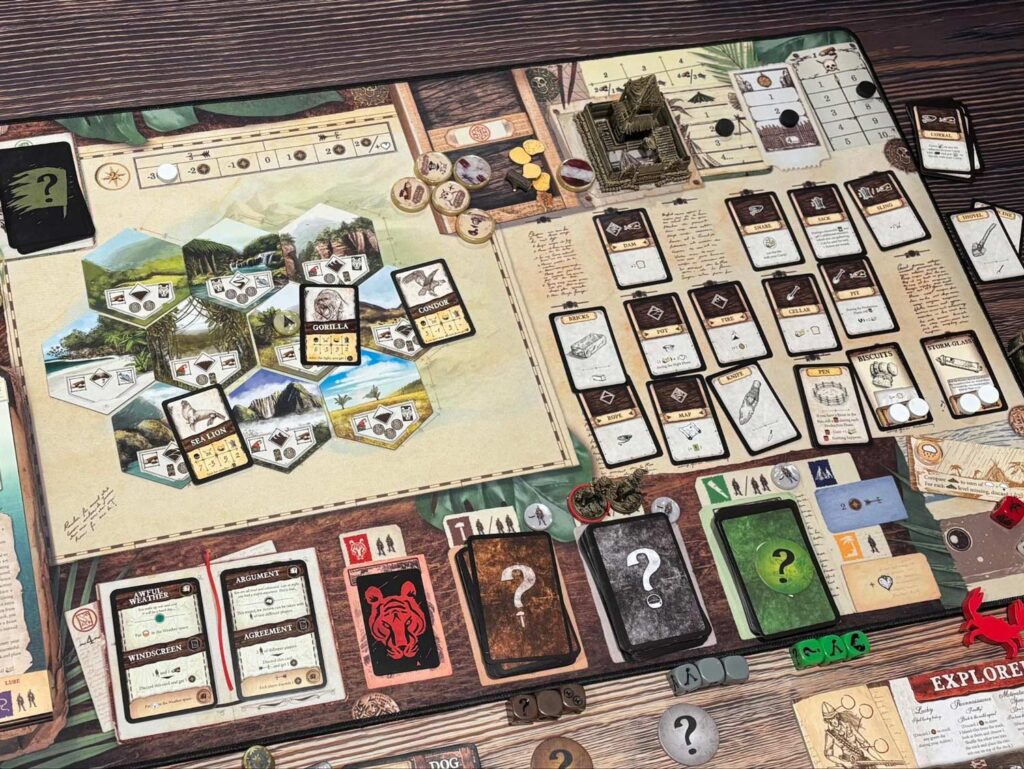
Relational conflict flares when someone forgets that there is no ‘I’ in team. It’s when one member of a team tries to fly solo, disrespects another member, dismisses their opinion, or bulldozes them by talking over them. Left unresolved, relational conflict is one of the most difficult types of conflict I’ve found in life. Strife; I hate it. Every situation is different so it’s hard to go on past experiences when you enter into new ones.
Board games can offer small exposures to relational conflict that may give us some tools to deal with the strife. Co-operative games demand the players stop fighting each other and fight the game if they want to be successful. Focus on the problem takes the center stage instead of the head to head conflict between each other. However, as we’ll see in a moment, sometimes some conflict between players can still rise off the table.
Pandemic is one of the granddaddies of co-op games, but in my mind, Robinson Crusoe is the grand master of co-ops. It takes its players and drops them into a scenario that is near hopeless unless they can learn to work together. Success will also require players to strategically take their fair share of the wounds the Cursed Island inevitably deals out. No one comes out unscathed, but self-protection almost guarantees failure. I’ve lost Robinson Crusoe more times than I’ve won, but the shared experience of the story draws the players together more than the loss breaks us apart.
Sometimes a relational conflict will arise in co-op games which can derail the team efforts: quarterbacking. If you’re unfamiliar with the term, it’s where one person makes all the decisions and other players lose their agency. If your co-op game isn’t fun because an alpha player is calling the shots, you may benefit from strategies we suggest in our benching the quarterback article. If quarterbacking is a problem in your group, you might try games like Spirit Island, in which there is simply too much going on to quarterback, or The Grizzled, which is a visceral attempt at making it through one more mission without sandbagging. It can force players into situations where they must exercise their own contributions to group decision making. Marvel United has an excellent mechanism to work through this. As play goes around the table, each player can utilize actions from the prior player’s card to amplify their own actions against the villain.
Let’s not forget the collective cheer and celebration that comes with a teamwork fueled win at the knife edge of a near loss. Zombicide: Black Plague has given some of our most exciting wins in this way. Uniting against a common enemy and learning how to work cooperatively is a huge life skill that can be learned from these type of games.
Navigate Financial Conflict
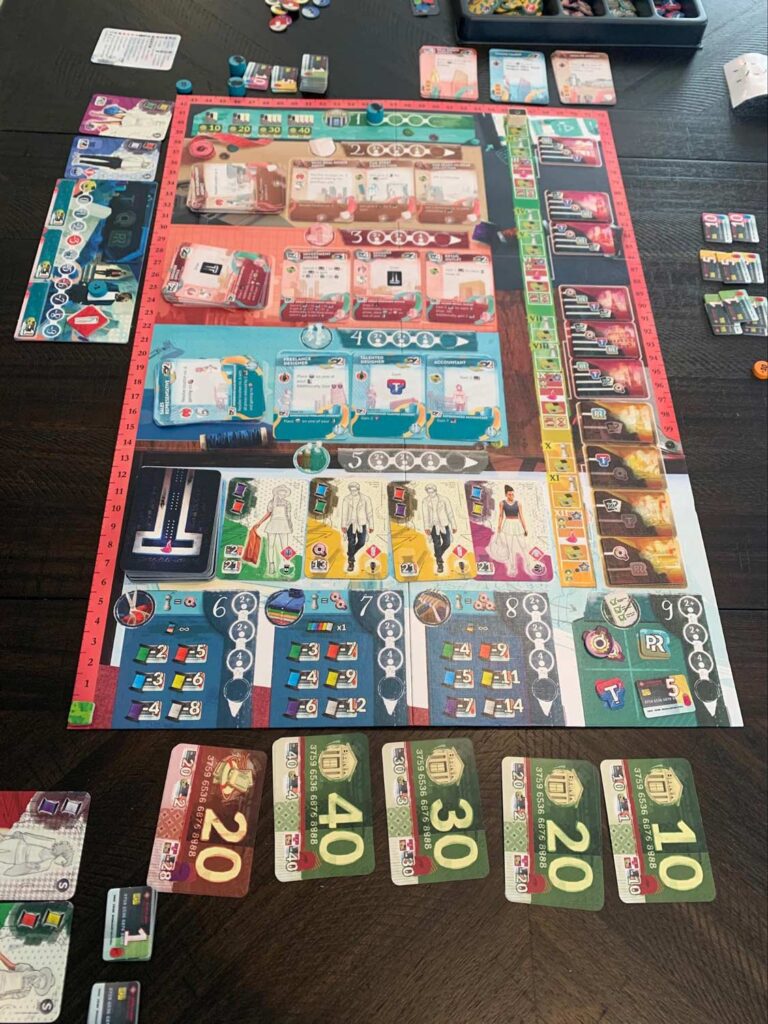
Financial conflict puts players in the arena of managing and directing their money. The conflict comes when we want to work towards a goal but don’t have the funds to get us there. That may even be self-induced. Let’s face it. There are some of us who just don’t do well at managing our resources. The shiny new hot game on Kickstarter or Gamefound sounds like a great addition to our libraries, but with Gamefound now offering financing of projects, I’m going to assume that there’s at least a corner of our hobby that values the flash over financial wisdom. As a recovering Arkham Horror completionist and Marvel United all-in backer, I’ve been there. No hate.
Let’s look at some games that can help us navigate the very traps we fall prey to. Prêt-à-Porter rewards its players for wise economy and investment into their business, even with some risk, as they’re trying to build a successful fashion company. GoodCritters allows players to try their hand at uneven wealth distribution after heists and can provide real time feedback of the bosses decisions. Lost Cities, even though it doesn’t have any actual money exchanging hands, guides players through risk assessment by taking on expeditions based on limited knowledge. All of these things can help navigate our financial decision making. At the very least, it opens up room for conversation around the table.
There’s even a version of Monopoly with electronic banking that came with several documents describing wise credit card usage and warned against debt. With some all-in pledges recently pushing the $500 mark, maybe this is one situation where Monopoly would’ve been the better choice.
Navigate Organizational Conflict
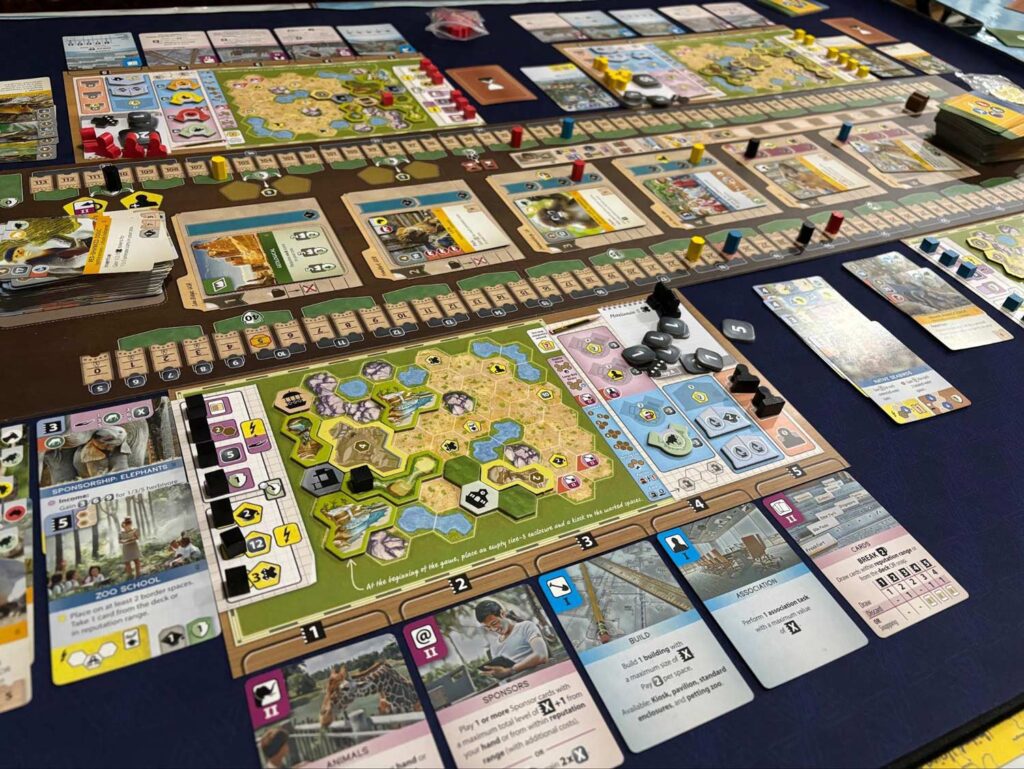
Organizational conflict comes when you have a lot of raw material in front of you that needs to be assembled in a way to be functional and you’re not quite sure the best way to do it. My Achilles heel in board games is engine building. Whenever we play Caverna, I end up trying to build the room that lets me eat rocks with my non-multiplying family while my wife has a cave and farm full of productive little dwarves. Recently, I played my first game of Ark Nova. My strategy was to do any move that I could see one or two steps ahead for. I lost miserably. In games like this, I struggle to see ways to put the puzzle together. Multiple paths to victory can be paralyzing.
Making things work is hard. It’s one thing to beat another player through sheer cunning and brute force in a direct conflict game of Blood Rage, but it’s another thing to put together an efficiently running resource production engine. There is a skill to making the machine work. Learning how to make all the gears and cogs turn in sync to become productive is overcoming a conflict of entropy. Victory points just do not come together on their own.
In Viticulture, the grapes aren’t going to grow themselves. You have to learn to manage all the resources you have to work with. With the inclusion of the Grande Worker, the design allows you to mitigate some of that relational conflict over the worker’s placement and focus on your vineyard. There’s enough conflict in trying to make your wine and the game gives you some breathing room to focus on that.
There is far less risk when it comes to building an organization on the tabletop than in real life. If we can learn the lessons these simulators are teaching us and then apply them away from the table, these games are becoming more than just games. The analysis and decision making that comes from being able to sort organizational conflict builds the skills of foresight and careful planning.
Navigate Internal Conflict
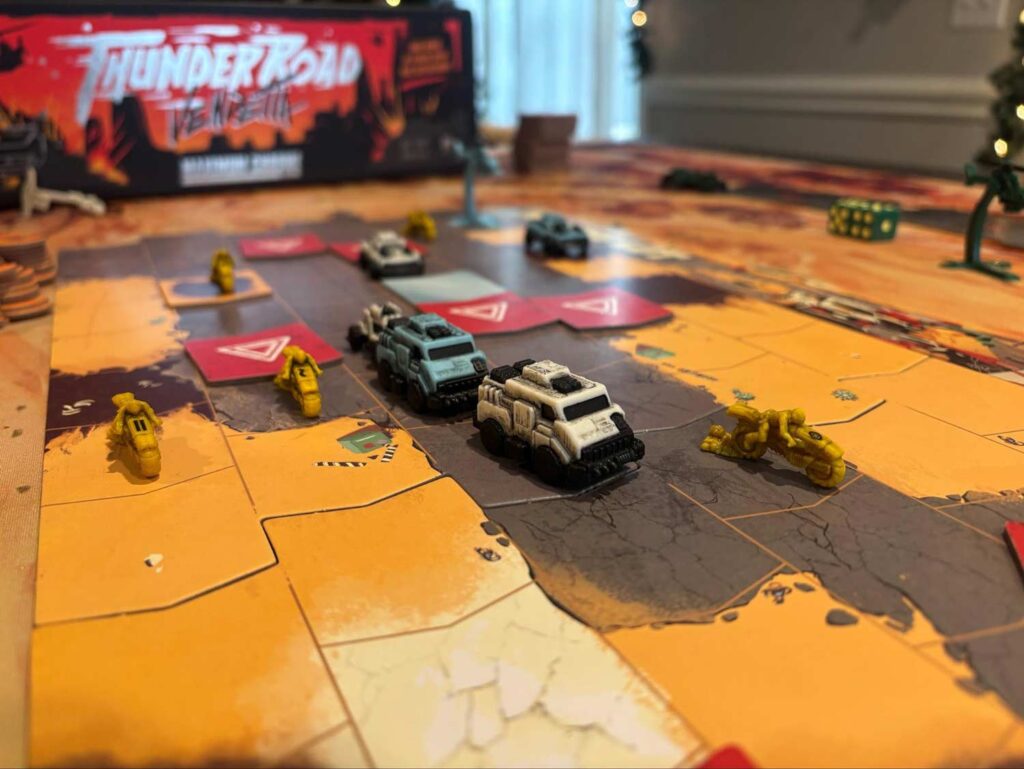
Internal conflict is what’s stirring up inside of us rather than what’s on the table. Perhaps you’ve had a bad experience with a game or even relational conflict with the person you’re playing with. Maybe you just need the rest. You could struggle when events are out of your control. There is conflict within us the outside world can’t see. The late Robin Williams said it well: “Everyone is fighting a battle you know nothing about. Be kind. Always.”
There’s a genre of cozy games like Flamecraft and River Valley Glassworks that are very chill. If conflict on or off the table makes you feel anxious, a cozy game could help you get some of the rest you’ve been wishing for.
Have you ever had a long week of putting on work-face like everything is OK when it’s not? In those times it may not really matter what type of game you play, but the relaxed social interaction is what’s most valuable. Regular scheduled gaming groups are a great way to create a rhythm of this. If you need to overcome shyness, a gaming event has helped others with that internal conflict.
If you have a hard time giving up control over your circumstances, try a game of luck. Embrace some random chance. Thunder Road: Vendetta isn’t about how awesome of a player you are. You might wind up careening into the face of a mountain after a rain of gunfire despite your best efforts and luckiest dice rolls. Exhale. Breathe a little. Have some fun.
Embarrassment can be another internal conflict. A silly game like The Root Beer Float Challenge or Throw Throw Burrito can help you get out of your comfort zone and just laugh a little. These games are too silly to allow for sharpened rules lawyers nuances. Just go with it.
Conclusion
Conflict rarely cuts clean lines so you may experience a blend of any or all of the five types of conflict in one gaming session. Conflict is messy, confusing, and can be difficult to deal with or sort out. If we approach board games as opportunities to work through and overcome conflict, we can be better equipped for our day to day lives long after we’ve packed the game pieces back into the box.
The tabletop offers countless teachable moments. Those moments can be lost in strategic gameplay or silly fun if we don’t have an eye to bring attention to them in the moment. Life happens in those moments of our days. If we enter our games as conflict simulators, we can not only emerge refreshed from the experience, but maybe we can stand up just a little bit better than when we sat down.
What games have you encountered that help navigate direct, relational, financial, organizational, or internal conflict? We’d like to know what you think! Drop them in the comments below.


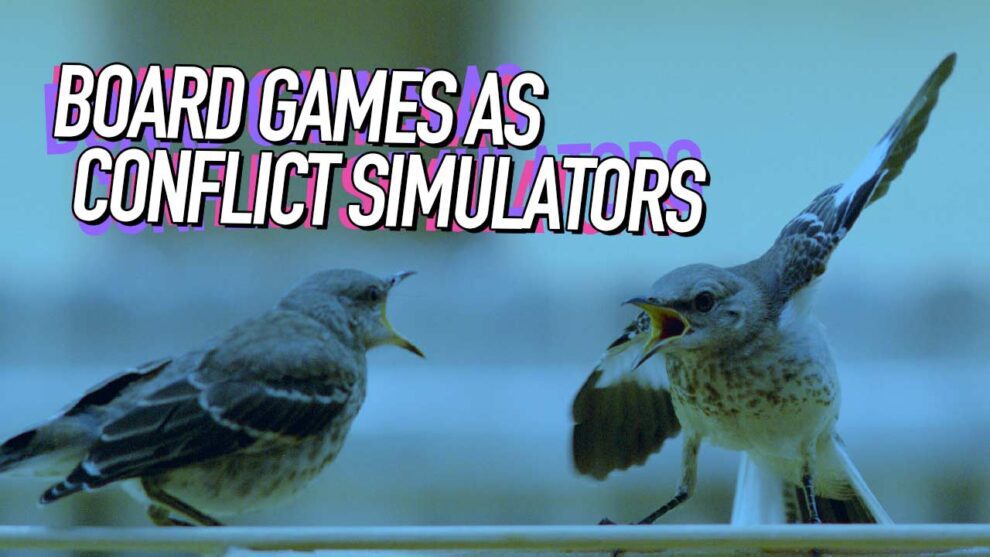




Add Comment